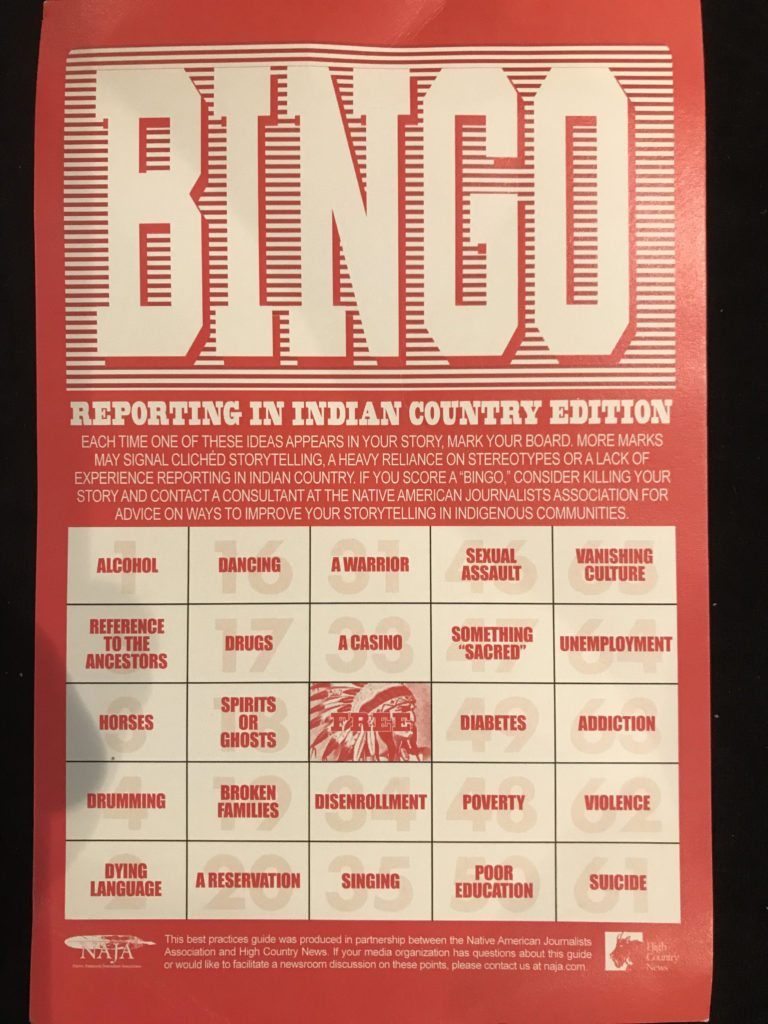NAJA bingo asks journalists to check their privilege

Alcohol. Sexual assault. Poverty. Diabetes.
These are a few of the words on a red bingo card made for journalists when reporting on the Indian Country. The instructions on the card say to mark a square every time one of these ideas appear on a journalist’s story. The more marks, the more cliches.
The cards were made by the Native American Journalists Association and posted on the organization’s website. At the National Association of Hispanic Journalists’ International Training Conference and Career Fair, which partnered with NAJA to put on its conference in Miami, fliers were also distributed.
Guides like these are meant to show the lack of understanding there is in reporting on Native American communities by many media outlets.
Jason Salsman, member of the Muscogee Creek Nation of Oklahoma and a Mvskoke Media multimedia producer, said recent stories such as a 13-year-old Native American boy who is a three time national champion in tumbling and trampoline or one about a woman who is making a comic book are the type of stories he would like to see.
“It’s stories of survival,” Salsman said. “It’s stories of we are here and we are living our lives in 2018 just like anyone else. We just so happen to be Native Americans and we certainly embrace our heritage and live that heritage, but at the same time we’re not some relic that is just these things on the bingo card.”
Salsman wants journalists to immerse themselves in a native community so they can learn to tell authentic stories about the community and not just cliches.
“We want our reporters and our people that are out there to get to know these people and these communities that they are covering,” Salsman said. “We want them to be able to tell the actual stories of life and living of what’s going on not just from a standpoint of this will get likes, this will get clicks.”
Bryan Pollard, NAJA president, who is Cherokee, said he finds it disappointing and frustrating to see stories that focus mainly on the stereotypes of his people.
Pollard said for journalists to cultivate sources and dig deeper on the issues of native communities.
“They [journalists] should actually do the native community the same service that they do with other communities which is to actually dispel some of those stereotypes rather than reinforce them,” Pollard said. “We are constantly finding ways to encourage our colleagues to report in a way that will help dispel those stereotypes.”
Tristan Ahtone, High Country News’ associate editor, was one of the leads in creating the bingo card. He felt it was a creative way grab someone’s attention.
The card, created last year, includes words such as “casino,” “addiction,” “something ‘sacred,’” “broken families,” among others.
If someone gets bingo on the card, the guide says a journalist should consider killing their story and contacting NAJA to get advice on how to improve their storytelling.
“It is not like the coverage of these issues here aren’t important … they obviously are,” Ahtone said. “For non-native journalists, it is a constant focus on these issues that become really problematic.”
The bingo card and the expert guide are not the first flyers NAJA has made in an effort to provide helpful reminders of how to approach a story.
The first flyer NAJA published was made two years ago, a reporting guide on how to cover the Indian Child Welfare Act.
“We found some really reprehensible coverage of our communities,” Pollard said.
Other examples include a sourcing guide, which was published and distributed at the 2018 conference, and shows how to identify a proper tribal expert.
“These [guides] are designed to sort of push reporters a little bit further to really think about how they’re approaching their work and the community and how they can do it differently,” Ahtone said. “(It) ultimately leads to better coverage.”
Email: LatinoReporterOfficial@gmail.com
Twitter: @diego_pineda19